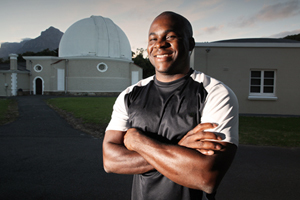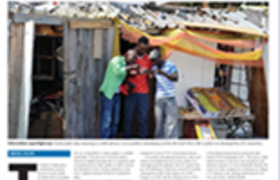Namibian astronomer reaches for exploding stars
17 February 2014
His enthusiasm for astronomy is unmistakable as he speaks on a matter that leaves most of us quite literally in the dark.
UCT doctoral student Eli Kasai's interest is in dark energy - a force in the universe that we cannot detect, but the effects of which we can observe. Dark energy appears to act against the force of gravity, and is thought to be the reason why the expansion of the Universe is accelerating and not slowing down.
Kasai is one of only two Namibians studying astronomy, despite the country's growing popularity among the astronomical fraternity as a host for increasingly powerful telescopes. Isak Davids - his brother in arms, so to speak - is a doctoral student at the University of the North West, and his area of interest is high-energy astrophysics.
Namibia hosts the world's largest gamma-ray telescope. It's also the frontrunner in the race to host the Cherenkov Telescope Array - the Square Kilometre Array's (SKA) rival in the gamma-ray or high-energy regime. Kasai's home country is set to host four stations of the SKA.
However, interest in the subject is low among his countrymen, and therefore Kasai, who has sufficient background knowledge in five areas of astronomy, is planning to join an astronomy outreach programme in Namibia later in this year.
"We received funding from the International Astronomical Union. We want to expose students to the field of astronomy, in the hopes of piquing their interest."
Kasai is from the north-eastern town of Rundu - about 700km from Windhoek, the capital.
"Until Grade 11 I wanted to be a medical doctor. Then one day during study time I found myself staring at the globe, thinking of the effect of day and night and the speed at which the earth travels on its own axis, and the fact that it revolves around the sun."
From then on his focus shifted from medicine to astronomy.
"I majored in physics and mathematics at the University of Namibia, because that's what my high-school career book indicated I had to study to become an astronomer."
He worked for five years at NamPower, the electricity supply company that funded his tertiary education. In 2010 he came to UCT for the National Astrophysics and Space Science Programme, and graduated last year with a master's in astrophysics.
For his doctoral thesis he is studying exploding stars - supernovae.
"With the help of SALT (the Southern African Large Telescope) we are able to measure the exact distance from Earth of an exploding star. From many of these distance measurements done for many supernovae, we can infer the nature of dark energy."
His dream is to contribute to efforts to establish an astronomy research team at the University of Namibia, but for now he is focused on completing his PhD at UCT, the institution with - in his opinion - the most advanced astronomy training programme in the country.
Story by Abigail Calata. Image by Micheal Hammond.
 This work is licensed under a Creative Commons Attribution-NoDerivatives 4.0 International License.
This work is licensed under a Creative Commons Attribution-NoDerivatives 4.0 International License.
Please view the republishing articles page for more information.
Doctoral Studies
News
Front page extra
Previous Editions










